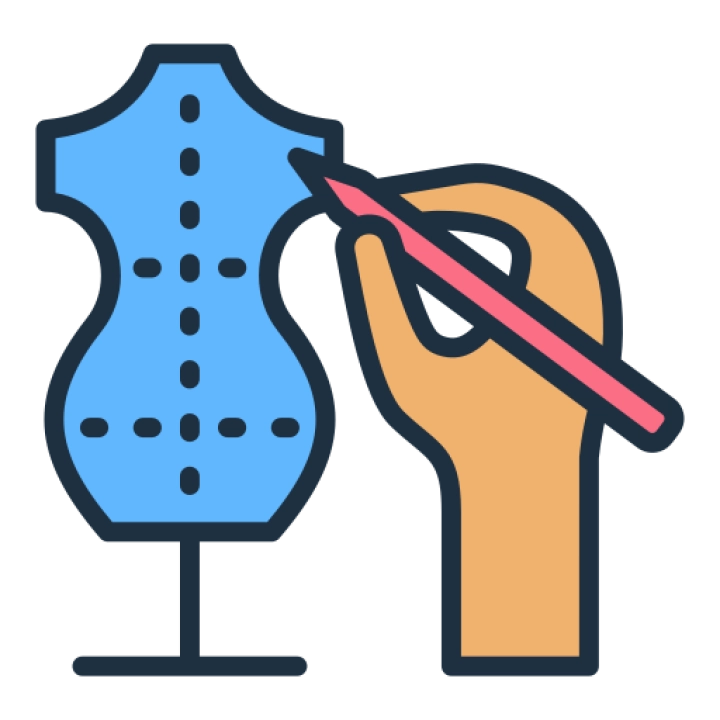College: Graduate Programs Institute
This specialization focuses on the creative and artistic aspects of textile and fashion design. Students explore key areas such as textile science, fashion design, pattern making, garment construction, fashion history, and sustainable fashion. The program emphasizes practical experience, innovation, understanding industry trends, and ethical considerations. Graduates are prepared for careers in fashion design, textile design, garment production, fashion merchandising, and related fields.
Learning Objectives:
- Understand the fundamentals of textile science and fashion design.
- Develop skills in pattern making, garment construction, and textile design.
- Learn techniques for creating innovative and sustainable fashion designs.
- Explore fashion history and its cultural impact.
- Understand the role of technology and industry trends in fashion design.
- Analyze challenges and opportunities in the fashion industry.
- Develop teamwork and problem-solving skills for design projects and initiatives.
Main Curriculum:
- Introduction to Textile and Fashion Design
- Overview of textile science, fashion design, and industry trends.
- Fundamentals of textile materials, fibers, and fabric construction.
- Principles of Fashion Design
- Fashion design principles, including concept development, drawing, and design software.
- Techniques for creating innovative and aesthetically pleasing designs.
- Pattern Making and Garment Construction
- Fundamentals of pattern making, including drawing, grading, and fitting.
- Techniques for garment creation, quality assurance, and fitting.
- Textile Design
- Principles of textile design, including weaving, knitting, printing, and dyeing.
- Techniques for creating unique and high-quality textiles.
- Fashion History and Cultural Studies
- Exploration of fashion history, cultural influences, and fashion trends.
- Techniques for analyzing and interpreting the role of fashion in society.
- Sustainable Fashion
- Fundamentals of sustainable fashion, including eco-friendly materials, ethical production, and waste reduction.
- Techniques for designing and producing sustainable fashion collections.
- Fashion Marketing and Merchandising
- Principles of fashion merchandising, including product development, branding, and retail strategies.
- Techniques for marketing and promoting fashion products.
- Fashion Design Research Methods
- Principles of research methods in fashion design, including trend analysis, market research, and consumer behavior.
- Techniques for conducting and evaluating fashion design research.
- Practical Training in Textile and Fashion Design
- Real-world design experiences, including observations, internships, and practical projects.
- Techniques for applying acquired skills in practical design settings.
- Capstone Project in Textile and Fashion Design
- A comprehensive project applying skills in fashion design, textile design, or sustainable fashion.
- Techniques for presenting a polished and innovative fashion collection.
Assessment Methods:
- Fashion design projects, pattern making and garment construction assignments, textile design portfolios, fashion history analyses, plans for sustainable fashion, fashion marketing and merchandising strategies, research methodology papers, internship reports, capstone projects, group projects, and internships.
Recommended Textbooks:
- "Fashion Design" by Sue Jenkyn Jones.
- "Pattern Making for Fashion Design" by Denic Chunman Lo and Kanika Lihlabanialert.
- "Textile Design" by Janet Stoevel.
- "Fashion History: A Global View" by Sarah A. Gordon.
- "Sustainable Fashion: Past, Present, and Future" by Alison Gwilt and Timo Rissanen.
Prerequisites:
Basic knowledge of art, design, and textile science. Suitable for students interested in fashion design, textile design, garment production, and fashion marketing.
Duration:
Typically 4 years for a bachelor's degree, including coursework, projects, practical training, and internships.
Certification:
Graduates can earn a degree in textile and fashion design and pursue further specialization or professional certification in fashion design, textile design, or sustainable fashion.
Target Audience:
Aspiring fashion designers, textile designers, garment producers, fashion merchandisers, and professionals seeking specialization in textile and fashion design. This specialization equips students with the creative, technical, and practical skills needed to excel in textile and fashion design, fostering creativity and sustainability in the fashion industry.

